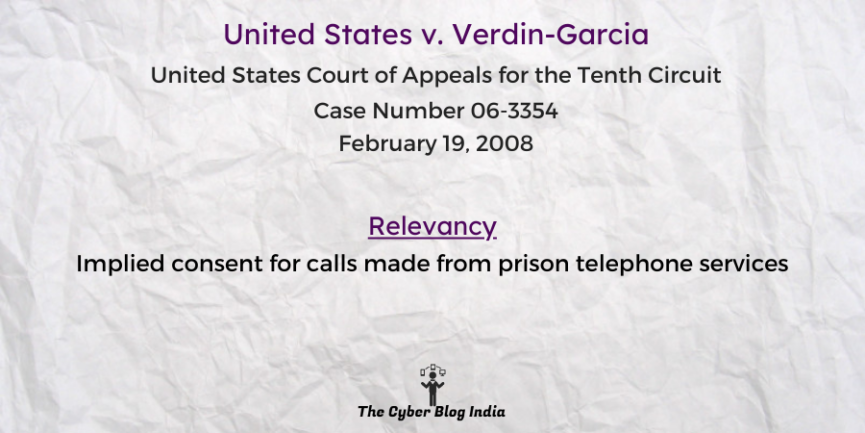United States v. Verdin-Garcia

United States v. Verdin-Garcia
516 F.3d 884
In the United States Court of Appeals for the Tenth Circuit
Case Number 06-3354
Before Circuit Judge Hartz, Circuit Judge McConnell and Circuit Judge Holmes
Decided on February 19, 2008
Relevancy of the case: Implied consent for calls made from prison telephone services
Statutes and Provisions Involved
- The Federal Wiretapping Act, 18 USC §§ 2510-2522
Relevant Facts of the Case
- The applicants were illegal immigrants from Nayarit, Mexico, who settled in Kansas City. They started their own marijuana and methamphetamine business in and around Kansas City, Kansas.
- In 2004, the Drug Enforcement Administration (DEA) opened a 10-month-long investigation into the Verdin-Garcia organisation. The DEA surveilled the organisation’s members by way of wiretaps.
- Towards the end of the investigation, they arrested co-conspirators having drugs on their persons. One of the co-conspirators who was arrested informed Verdin-Garcia about the bust. However, later on, the police apprehended the remaining members of the organisation.
- The authorities accused the appellants of multiple offences, and the trial court found them guilty. The appellants have appealed against their conviction.
Prominent Arguments by the Counsels
- The appellant’s counsel argued that the authorities used wiretaps unreasonably and that the government should have infiltrated their organisation instead. The counsel claimed that the authorities misinterpreted the wiretap conversations and that the court should have deemed them inadmissible. Moreover, the sentences imposed by the trial court were unreasonable.
- The appellee brought in Sara Gardner, an experienced translator who translated vague terms and gave all the meanings of “jale.” Ms Gardner’s knowledge and expertise enabled her to comprehend and translate the word. The government was able to prove that the word was slang within the drug subculture at Nayarit. Moreover, they provided adequate warnings regarding the phone calls to prisoners. Furthermore, they argued that Verdin-Garcia’s express consent was unnecessary. Hence, implied consent will satisfy the statute.
Opinion of the Bench
- The appellant’s arguments regarding the unreasonableness of their sentence were not persuasive.
- Since the amount of methamphetamine found in Romero’s possession was more than the 30,000 kg barrier, there was no need to address the issue raised by him.
Final Decision
- The court affirmed the District Court’s judgement.
Risha Thomre Rajani, an undergraduate student at NMIMS Kirit P. Mehta School of Law, Mumbai, prepared this case summary during her internship with The Cyber Blog India in May/June 2023.
